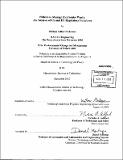Policies to manage electronics waste : an analysis of US and EU regulatory initiatives
Author(s)
Nickerson, William Arthur, 1971-
DownloadFull printable version (9.153Mb)
Other Contributors
Massachusetts Institute of Technology. Technology and Policy Program.
Advisor
Nicholas A. Ashford.
Terms of use
Metadata
Show full item recordAbstract
Policies to address the environmental challenges associated with the disposal of electronics waste are being developed in the US and the EU. This paper offers a standard critique of those policies and also analyzes them in terms of the likelihood they will induce innovation in response to their requirements. The US proposal relaxes the hazardous waste handling requirements for cathode ray tubes and mercury containing equipment, with the intent that more of them will be recycled. However, the rule does not contain any requirement that recycling occur, and the economic incentives to do so are minimal. Technological innovation and diffusion of current technology are both unlikely responses to the proposed rule. In addition, the rule does not apply to many users and types of electronics equipment, thereby only addressing a very small portion of the overall electronics waste issue. The rule fails to consider other materials found in electronics equipment and issues regarding recyclability, recycled content, secondary markets, and materials substitution. Two of the EU proposed directives are much more comprehensive in their coverage of electronics waste. They require certain recycling targets to be met and mandate the elimination of some hazardous substances from electronics equipment. Diffusion and incremental innovation are likely responses, with perhaps radical innovation only as the targets become more stringent in future years. The directives require additional clarification regarding the types of electronics equipment covered, financing mechanisms, the structure of the recycling targets, the granting of exemptions, and the development of secondary markets. Portions of the two EU proposed directives may be challenged under World Trade Organization rules. An analysis shows that provisions in the directives could face some difficulty in obtaining exemptions. A growing disconnect between global trade rules and the making of environmental policy is examined. Finally, one additional proposed EU policy that would require manufacturers of electronics equipment to consider the life cycle environmental impacts of the equipment during its design and manufacture is analyzed. At present, innovation is an unlikely response to this directive, though the inclusion of specific performance requirements could substantially improve it. Suggested modifications are offered for each of the policies examined.
Description
Thesis (S.M.)--Massachusetts Institute of Technology, Engineering Systems Division, Technology and Policy Program, 2002. Includes bibliographical references (p. 128-139).
Date issued
2002Department
Massachusetts Institute of Technology. Engineering Systems Division; Technology and Policy ProgramPublisher
Massachusetts Institute of Technology
Keywords
Technology and Policy Program.